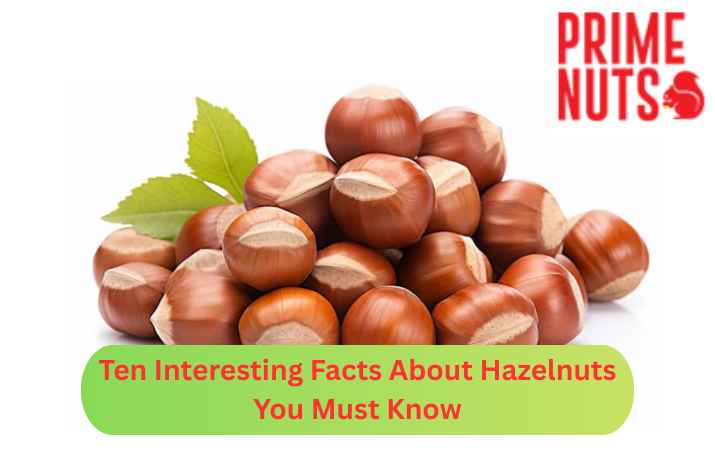
Ten Interesting Facts About Hazelnuts You Must Know

Introduction
Actually, hazelnuts aren’t just tasty in sweets and candies. These crunchy nuts have been loved for hundreds of years because they are full of nutrients, have a long past, and actually have surprising health benefits. The world keeps talking about hazelnuts, from their cultural importance to their part in modern nutrition. Let’s look at ten fun facts about hazelnuts that you have probably never heard before.
1. Hazelnuts Belong to the Birch Family
The hazel tree, which produces hazelnuts, belongs to the birch family. It has been grown across Europe and Asia for centuries. What makes it special is its long life—many hazel trees can thrive for decades, offering a steady supply of healthy nuts.
2. They Are Among the Oldest Cultivated Nuts
Archaeological evidence shows that people ate walnuts up to 9,000 years ago. People in ancient Europe ate them because they were high in energy. They were easy to store, so early people relied on them as a main food source.
3. Hazelnuts Are Nutrient-Dense
One of the most fascinating facts about hazelnuts is their rich nutritional profile. A 30-gram serving contains:
- Calories: Around 180
- Protein: 4 g
- Healthy fats: 17 g
- Fibre: 3 g
- Vitamin E, Magnesium, and Copper
This makes hazelnuts an excellent snack for boosting energy and supporting overall health.
4. Rich in Heart-Healthy Fats
Hazelnuts are full of polyunsaturated and monounsaturated fats that help keep cholesterol levels in check. Researchers say that eating hazelnuts every day may lower the risk of heart disease. They are very important for heart health when taken alongside antioxidants like vitamin E.
5. Hazelnuts help Boost Brain Function
Hazelnuts may help the brain work better and slow down cognitive loss because they have a lot of vitamin E, folate, and omega fatty acids. As you age and lose your memory, oxidative stress can damage brain cells. Hazelnuts contain antioxidants that protect brain cells from this damage.
6. They Are a Key Ingredient in Famous Spreads
If you like chocolate spreads or pralines, you already know that hazelnuts are a tasty ingredient in sweets. As a result of products like Nutella, hazelnuts are now loved all over the world. Also, hazelnuts are used in oils and recipes for foods other than sweets.
7. Cultural and Mythological Significance
In Celtic mythology, hazelnuts stood for intelligence and inspiration. According to old traditions, hazelnuts were magical foods that gave people knowledge. Hazelnuts are still important to many cultures around the world.
8. A great source of antioxidants
Vitamin E, manganese, and phenolic compounds are just some of the antioxidants found in hazelnuts. These protect the body from oxidative stress, lower inflammation, and minimize the risk of getting long-term diseases. Eating hazelnuts on a regular basis can help your immune system work better on its own.
9. Hazelnut Oil Is Highly Valued
People want hazelnut oil, which is more than just the nut itself. It can be used for cooking, skin care, and aromatherapy. The oil is light, readily absorbed by the skin, and full of vitamin E, which makes it a natural moisturizer. Hazelnut oil gives salads and fancy foods a nutty taste when used in the kitchen.
10. Hazelnuts Support Sustainable Farming
Hazelnuts are generally produced in places where they don’t need much water, which makes them better for the environment than other nuts. Turkey, Italy, and the United States are the top producers of hazelnuts in the world. This means that people all over the world can still get this nut.
Final Thoughts
Hazelnuts are more than just crispy treats. They are one of the most interesting nuts in the world because of their long history, cultural significance, high nutritional content, and positive effects on the environment. You can eat hazelnuts roasted, in desserts, or as oil, and they are good for you and taste good in every bite.
Adding hazelnuts to your diet can help your heart, brain, and overall health, so they are a great addition to any kitchen.



